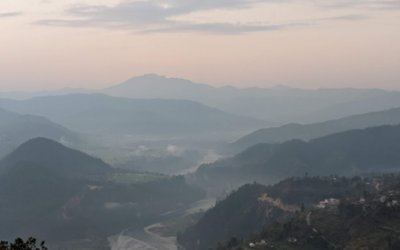SHYAM PRASAD MAINALI, Secretary of Water and Energy Commission, is a well known civil servant. Having worked for almost three decades, Mainali knows the ins and outs of Nepal’s civil service. As Nepal is celebrating the World Water Day, secretary Mainali spoke to NEW SPOTLIGHT on various issues. Excerpts:
WECS has played very important role in the formulation of water related strategy and policy. What is the current status of WECS?
Water and Energy Commission Secretariat (WECS) is a central level Government Organization working on sustainable development and management of Water Resources and Energy sector in Nepal. We are putting thrust on Integrated Water Resources Management (IWRM) principle and focusing on economic efficiency, social equity and environment conservation in our Water Resources Strategy and Plan. To transfer IWRM principle into implementation, WECS is currently working on formulation of Integrated Water Policy and establishment of knowledge based information system in WECS and River Basin Offices in three major river systems of Nepal; Koshi, Narayani and Karnali in collaboration with the Department of Hydrology and Meteorology to move forward in river basin planning for sustainable water resources management and development in Nepal.
Does your organization work in other areas?
WECS is also involved in Koshi River Basin Management Program under the framework of Koshi River Basin Management Strategy and is implementing the two pilot projects in Dudh Koshi and Indrawati sub basins with support of WWF Nepal for transition towards more adaptive and participatory integrated water resources management (IWRM). Similarly, WECS is doing a study in Bagmati River Basin on water security and pollution issues under regional Technical Assistance funded by ADB and Japan Water Agency.
How about the energy sector?
Energy is an important sector. We do have an abundant potential of hydro power development in Nepal. However, our country is facing an awful situation of energy crisis. WECS has prepared a National Energy Strategy which is in draft form and is yet to be approved by the Government of Nepal. We are also implementing Nepal Energy Efficiency Project under the TA program provided by Government of Germany through GTZ Nepal which includes components like public awareness and formulation of policy driver on energy efficiency, energy efficiency in house hold (rural as well as urban), preparation of standards and labeling for energy efficient electric appliances, establishment of energy efficiency centre with public private partnership approach, and energy auditing on industrial sector.
As Nepal is in the process of constitution making for a federal setup, many problems will come up in water sharing among provinces. What role will the organization like WECS play in the future?
Nepal, as of now, is the only state facing problems regarding water sharing. We can definitely say that water sharing issues in federal Nepal are very likely to increase, especially among different provinces. We are yet to define the borders of our provinces. If a river basin falls within two or more provinces' the chances of conflicts on water sharing issues among the provinces are seemingly likely, as we have seen in many parts of the world. Since rivers do not follow any political boundary, and since the water resources are key to life and Nepal's prosperity, the available resources must be optimally planned and equitably distributed to all the concerned provinces based on their needs. Thus the role of WECS will be much more important in the federal structure of the country since it is the central level, apex organization regarding the planning, development and management of the country's water resources. In the federal structure, WECS possible role could be in integrated water resources planning and management, basin planning, benefit optimization, conflict resolution etc.
What are its mandates?
As I have already mentioned the mandates of WECS are huge. Its primary responsibilities are to formulate necessary policies, strategies and planning of projects with long term visions, conduct study, research, survey and analysis on various aspects of water resources and energy development in keeping with the priorities and targets of Government of Nepal. Besides, Water Resources Strategy and National Water Plan have mandated WECS as Central Regulatory Body and have imparted the authority to provide techno-economic clearance for various major water related projects including multi purpose projects/projects with inter-basin transfer/trans-boundary implications. However, this authority is yet to be supported by legal instruments for effective implementation.
Has WECS made any contribution in constitution making?
WECS has conducted a series of workshops and discussions/interactions among various stakeholders including Constituent Assembly members, eminent water experts, and civil societies to advocate the state restructuring in the perspective of natural resources management. WECS with representation by its officials in Natural Resources, Economic Right and Revenue Sharing Committee has been providing valuable inputs as and when necessary. WECS and Jalasrot Vikas Sanstha (JVS) jointly organized a two day discussion program to make necessary suggestions/recommendations on the report prepared by the Committee. Proceedings of the program have been duly submitted to the Chair of the Constitutional Committee.
Nepal is celebrating the world water day, in what way is WECS contributing?
World Water Day is held annually on 22 March since 1993. Each year, World Water Day highlights a specific aspect of freshwater. WECS is taking a lead role in the celebration of the World Water Day since 2009. This year UN-Water has dedicated World Water Day 2011 (WWD 2011) to the theme Water and Urbanization, with slogan Water for Cities: Responding to the Urban Challenges. The objective of World Water Day 2011 is to focus international attention on the impact of rapid urban population growth, industrialization and uncertainties caused by climate change, conflicts and natural disasters on urban water systems. We are organizing week-long events (March 17-23) to observe the day. A National Organizing Committee, consisting of government officials, semi-government officials, representatives of the private sector and NGOs has been formed under the Chairmanship of the Secretary of WECS. WECS will guide and support all the stakeholders to implement the activities effectively at national, regional and local level.
Experts are predicting that the climate change is going to affect Nepal’s glaciers. As a policy level institution of water, what role has WECS been playing?
The glaciers of Greater Himalaya are known as Water Tower of Asia and support the livelihoods of the billions of people residing in the region. Several studies conducted show that climate change will have adverse effect on water as well as energy sector including many other sectors like agriculture, health, and environment. As a result of global warming, it is believed as a fact that the glaciers have been retreating and resulting in expansion of existing glacial lakes and forming new glacial lakes.
Is WECS is doing something on this?
WECS) in association with ICIMOD has been involved in the study of Glacier Lake Outburst Flood (GLOF) assessment and mitigation aspect of potentially dangerous glacier lakes in Nepal. WECS has also prepared a concept paper on GLOF. Besides, WECS has prepared report on Water Resources of Nepal in the context of Climate Change. This report is released on March 17, 2011.
As WECS is known for its expertise, what is the state of WECS now?WECS with its expertise on water and energy can play and is playing a pivotal role in the water and energy sector of Nepal. WECS’s expertise on river basin planning and management, modeling of water use and allocation, development of multi-purpose projects and trans-boundary water issues will be very useful for the government agencies as well as private developers. It can provide technical support on resettlement and rehabilitation programs in hydro-electric projects, water optimization in river basins and resolution of the conflict between different competing uses of water. No other institution in the country can provide a holistic overview of the water sector of Nepal than WECS.
What are other areas?
Based on its expertise, WECS has initiated and is implementing many programs which I have already mentioned above. Additionally it is working as a secretariat of the WEC-Nepal National Committee for World Energy Council (WEC), secretariat of the ICOLD-Nepal National Committee for International Commission on Large Dams (ICOLD) and is the member of these organizations. It is also a member of Network of Asian River Basin Organization (NARBO) and Water and Environment Partnership in Asia (WEPA). It is also entrusted as the focal point of BIMSTEC for energy sector.
Nepal has been facing severe water as well as energy crisis. What role WECS can play to find out a long term solution?
The present crisis is the result of our inaction of the past, whether we talk about water supply or energy. During the last one decade we could not do much in harnessing our water resources, whether it is for water supply or hydropower generation. The electricity supply could not match the ever increasing demand because of the nature of our hydro-electric projects (Run of River type). Similarly our water supply could not match the rapidly increasing urban population because we did nothing in action even though the crisis was looming over our head. In order to get out of the vicious circle, we have to add more projects in a shorter span of time and develop transmission network to evacuate the energy generated from different power stations.
What has WECS done in this regard?
WECS was entrusted as the coordinator of the task force to formulate Twenty Year Hydro-electricity Development Plan. During the study, it was found that if we honestly work hard, the country can generate 1815 MW of electricity by the year 2014 out of which 1645MW will be available for domestic consumption and the rest for export. The next five years will be crucial for the energy sector of the country.
Despite its institutional capability and technical expertise, WECS is said to be made as a dumping ground for technical and civil service people .How do you look at this?
I would not entirely agree with your statement of WECS made as a dumping ground for technical and civil service, although there are some issues which may have triggered you to make such a statement. Personally for me, it has been quite a useful experience. As you know I am not a technical person in relation to water and energy sector. Being a generalist, I have had a great opportunity to enhance my knowledge regarding water and energy sector after coming to WECS.
Tell us more on your experience?
WECS is regarded as a think tank for Government of Nepal in the area of water and energy and it has expertise also, but due to the lack of clear cut work mandate with full legal backing, it has been quite difficult to perform up to the expectations. Institutions like WECS need to be independent and not under the shadow of a particular ministry.
Since large numbers of employees are hanging here and there, how do you claim that it is not a dumping ground?
Dumping ground for technical and civil service personnel is a place where there is no scope for showing ones' personal performance and expertise. Contrary to this, WECS as an institution has ample scope for its employees to show their performance and expertise. It has very good reputation among similarly mandated international organizations and relevant experts.
- TANAHU HYDROPOWER PROEJCT: A Significant Achievement
- Apr 15, 2024
- AMBASSADOR HANAN GODAR: Sharing Pain With A Nepali Family
- Mar 30, 2024
- VISIT OF KfW AND EIB TO NEPAL : Mission Matters
- Mar 25, 2024
- NEPAL BRITAIN SOCIETY: Pratima Pande's Leadership
- Mar 24, 2024
- NEPAL ARMY DAY: Time To Recall Glory
- Mar 15, 2024
















